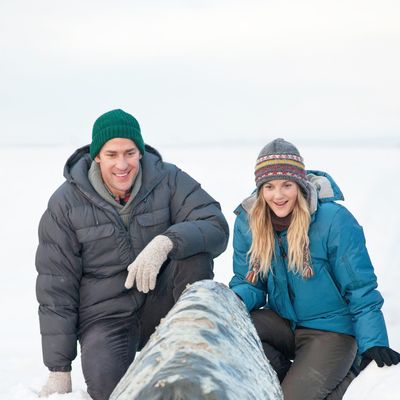
ThereÔÇÖs probably a good film to be made out of Operation Breakthrough, the fascinating real-life 1988 media frenzy around, and ensuing rescue of, a family of whales trapped in the Alaskan pack ice, but Big Miracle isnÔÇÖt it. Ken KwapisÔÇÖs family-friendly attempt certainly understands thereÔÇÖs something special in a tale of how the news media, Alaskan natives, capitalist scum, environmental activists, Republican political operatives, some intrepid oddballs, and both the U.S. and Soviet militaries put aside their differences and came together to aid these three helpless whales while an entire nation watched, transfixed. But the film bulldozes any genuine nuance or insight or even emotion in exchange for ready-made plot points and by-the-numbers catharsis.
The film starts off promisingly. Adam Carlson (John Krasinski), a TV reporter filing from Barrow, a remote corner of Alaska populated mostly by Inupiat tribesmen, happens upon the story of a lifetime when three California grays are discovered stuck in the ice, with only a small hole through which they are able to surface to breathe. Soon enough, the media arrives, along with AdamÔÇÖs ex-girlfriend Rachel (Drew Barrymore), a fiery Greenpeace activist. Also eager to help ÔÇö for purely craven, PR reasons, of course ÔÇö is an oil tycoon (Ted Danson), one of RachelÔÇÖs b├¬tes noire, as well as the Reagan administration, looking to do cleanup on its crappy environmental record.
There are a couple of surprising conflicts early on. Rachel is outraged at the fact that the Inupiat actually hunt whales for food, and that they think these three beasts were sent by the heavens to help feed their families. We know the natives (and everybody else, frankly) will eventually come to bleeding heart RachelÔÇÖs way of thinking, so itÔÇÖs somewhat to the filmÔÇÖs credit that she at first seems fairly harsh; weÔÇÖll take unpredictable character choices wherever we can get them.
A similar reversal ÔÇö though in the opposite direction ÔÇö happens with sorta-big shot L.A. reporter Jill Gerard (Kristen Bell), with whom Adam seems mildly obsessed. Jill gets a few insightful moments early on: When Rachel accuses her of caring more about ratings than whales, she retorts, ÔÇ£The ratings are whatÔÇÖs going to keep the rescue going, and thatÔÇÖs whatÔÇÖs going to save the whales.ÔÇØ Later, Jill even remarks on the imbalance of the media coverage surrounding the whales. ÔÇ£Do you know there are, like, twenty wars going on all around the world as we speak?ÔÇØ she asks Adam, in one of her more reflective moments. (ItÔÇÖs actually a point worth highlighting: Elsewhere, as the whale rescue operation was going on, Saddam Hussein was wrapping up his genocide of the Kurds, a human catastrophe America retroactively decided it cared about only when we invaded Iraq.)
But no matter: We know that Jill will eventually prove herself to be hopelessly vain and ambitious (ÔÇÿcause sheÔÇÖs a fancy-pants reporter from L.A., see). Just as we know that the various stake-holders in the whale rescue ÔÇö which eventually comes to include a Soviet icebreaker ÔÇö will all chip in and do the right thing. With a film like Big Miracle, the problem isnÔÇÖt the destination, but how it gets there, and over and over, Jack Amiel and Michael BeglerÔÇÖs script takes the easy, pre-digested way out. Heck, the film even squanders its totally contrived love story: We expect some kind of fiery chemistry and bitter back-and-forth between Adam and Rachel, but, really, all we get are a couple of knowing looks and, later, a totally unearned romantic reunion.
Admittedly, itÔÇÖs silly to ask for something like Big Miracle to give us a cutting portrait of media opportunism like The Big Carnival, or some kind of expansive, Altman-esque portrait of American social strata. But itÔÇÖs not out of line to ask that the movie show some care. We donÔÇÖt even get nice visuals; everything looks like it was shot on the cheap. The whales, when we finally see them underwater, donÔÇÖt have any weight to them, and we miss their majesty. Even the scenery looks cardboard much of the time. They keep saying itÔÇÖs really cold but nobody seems to have bundled up properly. (We donÔÇÖt even see anyoneÔÇÖs breath. Is this Alaska, or is it Burbank?) The filmÔÇÖs carelessness on the visual polish front echoes the confusing disposability of its script. At various points it tries on the guise of media satire, love story, inspiring rescue tale, culture clash, and paean to the environment, but keeps settling for pre-digested half measures. By the time Sarah Palin shows up at the end (donÔÇÖt ask), we donÔÇÖt even blink; it just feels like one last ÔÇ£screw youÔÇØ to the audience.


